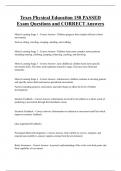Texes Physical Education 158 PASSED
Exam Questions and CORRECT Answers
Motor Learning Stage 1 - Correct Answer- Children progress from simple reflexes to basic
movements.
Such as sitting, crawling, creeping, standing, and walking
Motor Learning Stage 2 - Correct Answer- Children learn more complex motor patterns
including running, climbing, jumping, balancing, catching, and throwing
Motor Learning Stage 3 - Correct Answer- Late childhood, children learn more specific
movement skills. The basic motor patterns learned in stage 2 become more fluid and
automatic
Motor Learning Stage 4 - Correct Answer- Adolescence, children continue to develop general
and specific motor skills and master specialized movements.
Factors including practice, motivation, and talent begin to affect the level of further
development.
Intrinsic Feedback - Correct Answer- Information received by the athlete as a direct result of
producing a movement through the kinesthetic senses
Extrinsic Feedback - Correct Answer- Information not inherent in movement itself but which
improves intrinsic feedback.
(aka Augmented Feedback)
Perceptual-Motor Development - Correct Answer- One's ability to receive, interpret, and
respond successfully to sensory signals coming from the environment
Body Awareness - Correct Answer- A person's understanding of his or her own body parts and
their capability of movement
, Spacial Awareness - Correct Answer- The ability to make decisions about an objects
positional changes in space
Effort Awareness - Correct Answer- The knowledge of balance, time, and force and how they
relate to athletic movements and activities.
Locomotor Skills Acquisition - Correct Answer- Crawl, creep, walk, run, jump, hop, gallop,
slide, leap, skip, step-hop
Non-locomotor Skills Acquisition - Correct Answer- Stretch, bend, sit, shake, turn, rock &
sway, swing, twist, dodge, fall
Manipulative Skill Development - Correct Answer- Striking, throwing, kicking, ball rolling,
volleying, bouncing, catching, trapping
Components of Physical Activity - Correct Answer- Cardiovascular endurance, muscle
strength, muscle endurance, flexibility, body composition
Cardiovascular Endurance - Correct Answer- The body's ability to sustain aerobic activities
for extended periods
Muscle Strength - Correct Answer- Is the muscle groups' ability to contract and support a
given amount of weight.
Muscle Endurance - Correct Answer- Is the muscle groups' ability to contract continually
over a period of time and support a given amount of weight.
Flexibility - Correct Answer- The muscle groups ability to stretch and bend.
Body Composition - Correct Answer- Used to describe the percentage of fat, bone, water, and
muscle.
Overload Principle - Correct Answer- Exercising at an above normal level tom improve
physical or physiological capacity.




